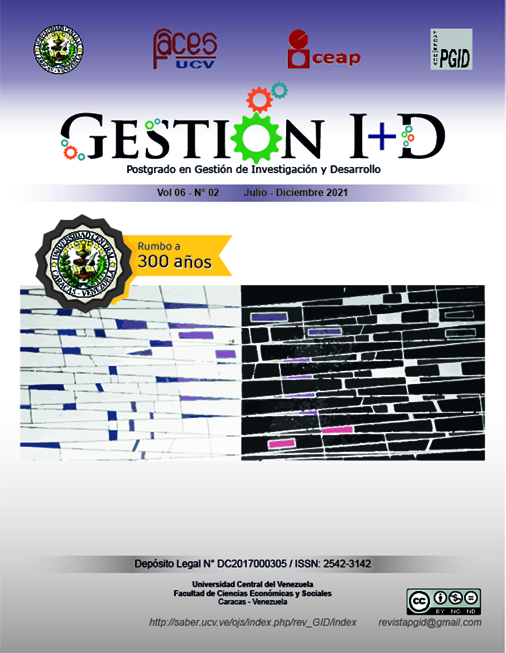Constructing the object of studies in doctoral research
Abstract
This research aims to, throughout the text, analyze the product of the authors' experiences on the path followed to approach the object of study and generate theoretical approaches in a specific field of knowledge. To this end, an analytical-reflective approach was applied. The results reveal the research development of doctoral students, which implies transferring the different stages that start from the contextualization of reality, scientific rigorousness, and successive approaches to teleological, theoretical, methodological, and epistemic sources, with criteria of ethical rigorousness. A scientific understanding of this process is essential, which entails a clear differentiation for the support of contributions in philosophy of science, especially Popper (1976), Kuhn (1962), Lakatos (1978), and Feyerabend (1991), whose influence in the field of formal and factual sciences helped them be felt in social sciences. This research and interpretation by the authors allows them to demystify the debate of carrying out research in social sciences that are appropriate with the social and cultural context, which allows one to solve problems with scientific formality.
Keywords: doctoral thesis; object of study; philosophy of science; epistemology; research in social sciencesDownloads
References
Aristóteles. (2015). Metafísica. Madrid: FV Editions
Bourdieu, P. (1992). Oficio del Sociólogo.: México, D.F; Siglo XXI Editores:
Briones, G. (1988). Métodos y Técnicas Avanzadas de Investigación Aplicadas a la Educación y a las Ciencias Sociales. Bogotá: ICFES PIIE.
Caldera, R. T. (2010). El oficio del sabio. Pamplona: S.A. EIUNSA. Ediciones Internacionales Universitarias.
Cerda, H. (2005). Los Elementos de la Investigación. Bogotá: Códice Ltda.
Etienne, G. (1974). El amor a la sabiduría. (R. T. Caldera, Trad.) Caracas: Colección Senderos.
Feyerabend, P. (1981). Tratado contra el método. Madrid: Tecnos.
Feyerabend, P. (1991). Diálogos sobre el conocimiento. Madrid: Cátedra.
Feyerabend, P. (1995). Matando el tiempo. Madrid: Debate.
García, R. (2000). El conocimiento en construcción. Barcelona: Gedisa.
Guber, R. (2001). Método, Campo y Reflexividad. Bogotá: Grupo Editorial Norma.
Kant, E. (1988). Crítica de la razón pura. México: Porrúa.
Kuhn, T. (1962). La estructura de las revoluciones científicas. México, D.F.: Fondo de Cultura Económica.
Lakatos, I. (1978). The Methodology of Scientific Research Programmes. Cambridge: Cambridge University Press.
Moreno, A. (2006). El aro y la trama. Caracas: Convivium Press.
Moulines, C. (2015). Popper y Kuhn. Buenos Aires: Emse Edapp, S.L. .
Nonaka, I., & Takeuchi, H. (1995). The Knowledge-Creating Company. New York: The Oxford University Press.
Nubiola, J. (2002). El taller de la filosofía de Jaime Nubiola. Pamplona: Eunsa.
Popper, K. (1976). Conjeturas y refutaciones. Barcelona: Paidós.
Popper, K. (1985). La lógica de la investigación científica. Madrid: Tecnos.
Popper, K. (1995). En busca de un mundo mejor. Madrid: Ediciones Paidós.
Potter, J. (1996). La Representación de la Realidad. Discurso, Retórica y Construcción Social. Barcelona (España): Paidós.
Rivera de Rosales, J. (1994). Seminario de Historia de la Filosofía. Cuestiones metodológicas en la investigación filosófica (pp. 9-52). Madrid: Editorial Complutense.
Vásquez, G. (Enero-Junio de 2019). Racionalidad y realidad: Una visión de continuidad en Marx, Popper y Feyerabend. Revista Estudios Culturales, 12(23), 15-36. Obtenido de https://www.austral.edu.ar/filosofia/wp-content/uploads/2016/06/Antes-y-despues-de-Popper.pdf
Zanotti, G. (junio de 2016). Reflexiones sobre filosofia de la ciencia. Obtenido de https://www.austral.edu.ar/filosofia/wp-content/uploads/2016/06/Antes-y-despues-de-Popper.pdf



